Oil, Steel Industry Workers Join Strikes In Iran
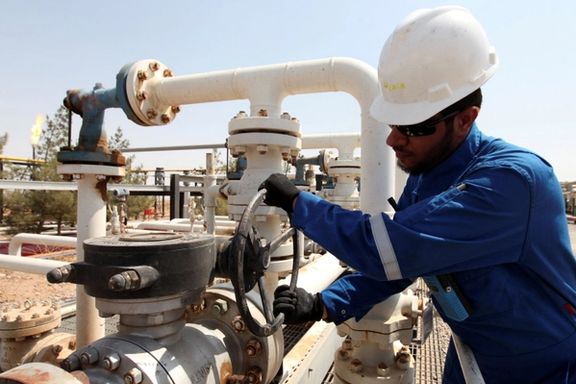
Reports say employees of Iran’s Oil Ministry in tens of oil rigs in the south have gone on strike to show anger at government mismanagement and unfair wages.

Reports say employees of Iran’s Oil Ministry in tens of oil rigs in the south have gone on strike to show anger at government mismanagement and unfair wages.
Civil rights activist, Atena Daemi, said in a tweet on Tuesday that in the first step the workers of at least 37 rigs in a symbolic action refused to receive food at canteens.
In their notes put on plates, they warned the regime officials that “the hard winter is coming” probably implying the government would be in trouble during winter to provide natural gas and diesel while they stop working.
Meanwhile, videos published on social media show the workers at Esfahan Steel Company, which is Iran's third largest steel producer, have joined the nationwide strikes.
Hundreds of striking employees have been arrested in the past few weeks while many are threatened with being fired or replaced by other workers if they do not break their strikes.
In the meantime, many Iranians on social media have warned merchants at grand bazaars to join the strikes to cripple the government which has been violently cracking down on protesters seeking social and political liberties for over 50 days now.
People say if the guilds and merchants do not go on strike, they will boycott their goods and products.
People were observing a “general strike” in Mahsa Amini’s hometown of Saqqez, and some other cities mainly in the Kurdish regions where retailers have closed their shops several times in protest to government brutality.
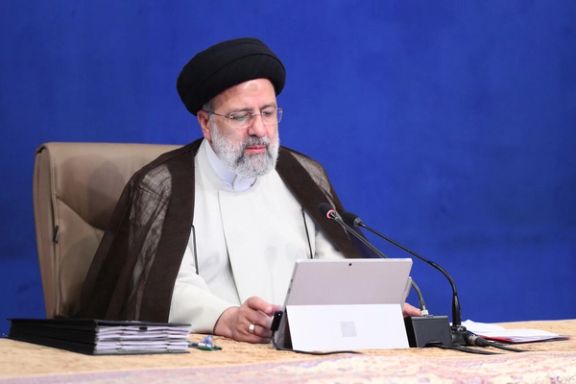
Iranian online business owners have called on authorities to remove restrictions on Internet that it almost fully shut down since antigovernment protests started in mid-September.
In a letter to President Ebrahim Raisi on Sunday, over 1,200 Iranian business owners and people working in the field of information technology urged the lifting of restrictions and the release of imprisoned IT activists. The signatories are members of 13 associations and trade unions.
Criticizing the recent disruptions and extensive restrictions, these activists on Sunday reminded Ebrahim Raisi of his campaign promise to offer “access to free Internet.”
Since the current wave of protests has begun following the death in custody of 22-year-old Mahsa Amini, the government has blocked popular social media apps including WhatsApp and Instagram, and also cut access to the Internet for long hours every day to prevent circulation of information.
The signatories of the appeal also criticized limitations on social communication tools and cracking down on the activists in this field, adding that such measures have led to "public dissatisfaction" in addition to endangering the livelihood of millions of people.
The signatories of the letter also asked the government to restore “lost public trust” by “freeing the people who have been arrested simply because of their activities in this industry.”
Within the past weeks, in addition to the detention of many protesters and political activists, several well-known IT activists have been apprehended without any specific charges.
On Monday, Kaivan Jamebozorg, a board member of the Tehran IT Trade Union Organization, said there is currently no such thing as the Internet in the country but a “warped and unstable network” that cannot be relied on for business.
He noted that the digital economy is far beyond the contours of online businesses and has an important potential as a driving force for the development of the economy in general, as well as social and cultural spheres of the country, therefore the lack of free access to the Internet and international platforms will render the national network ineffective. "This network will be futile and useless without a stable internet and free access to it by people and businesses," he said, referring to the government’s plans to establish a domestic intranet network under its control.
Recently, Iran's Chamber of Commerce announced that every hour of internet interruption has an economic loss of about $1.5 million, which is equivalent to $36 million a day.
The curfew-style shut down of the internet has also begun to show its highly damaging impact on several industries including food, medicine, and steel production, damaging the production cycle and its destructive effect on the livelihoods of millions.
While Iranian hardliners say restrictions on Internet access will remain in place as long as street protests and strikes continue, Vahid Jalalzadeh, the chairman of the National Security Committee of the Iranian parliament, said in October that the Islamic Republic will provide Iranians with access to the Internet if European countries cut off “anti-Iran” networks in cyberspace.
Late in September, Iran’s foreign ministry had summoned the British ambassador in Tehran over what it called “a hostile atmosphere” created by London-based Persian media outlets. There are three London-based major Iranian satellite TV channels beaming programs into Iran; Iran International TV, Manoto TV and BBC Persian.
The US Senate Foreign Relations Committee is now considering a bill to support global Internet freedom, following government disruption of access in Iran amid protests.
Authorities disrupt the Internet to prevent news of unrest reaching the rest of the country and abroad, and to prevent protesters from galvanizing support in nearby regions.
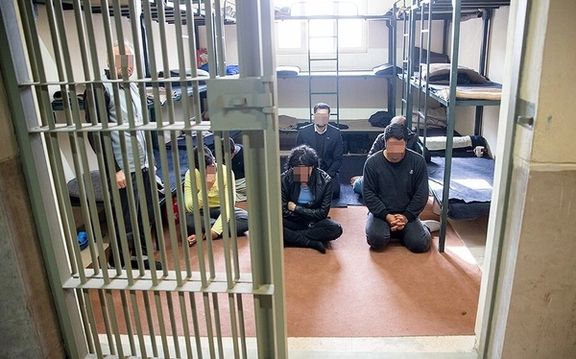
After a threat by hardliner lawmakers last week asking that protesters be sentenced to death, Iran's Judiciary Tuesday signaled its intention to do just that.
Judiciary spokesman Masoud Setayeshi said that courts will deal firmly with anyone who causes “disruptions or commits crimes” during the ongoing wave of antigovernment protests.
The Judiciary’s statement is ominous for many activists because there are no independent courts in Iran. Both prosecutors and judges answer to the same Judiciary controlled by hardliners. In most political trials also, there is no due process of law, no freedom to choose defense lawyers and little access to case files.
Iran’s Judiciary can frame people for crimes they did not commit, as multiple cases have demonstrated in the past. It can defy what “disruption” means and sentence any protester to death for causing an ill-defined act of disruption.
One of the biggest challenges to Iran's clerical leaders since the 1979 Islamic Revolution, the seven-week-old demonstrations have persisted despite a deadly crackdown and severe warnings from security forces.
More than 1,000 people have been indicted in connection with what the government calls "riots".
"Now, the public, even protesters who are not supportive of riots, demand from the judiciary and security institutions to deal with the few people who have caused disturbances in a firm, deterrent and legal manner," judiciary spokesman Masoud Setayeshi claimed.

Another keyword in this statement is “riots”. The regime calls the protesters rioters, without ever having issued a demonstration permit to anyone other than its loyal followers. ‘Reformist’ parties that are not opposed to the Islamic Republic asked for an official permit to gather in September and received no answer.
Anti-government demonstrations erupted in September after the death of a Kurdish woman Mahsa Amini, who had been detained by morality police for allegedly flouting the Islamic Republic's strict dress code imposed on women.
The activist HRANA news agency said that 318 protesters had been killed in the unrest as of Saturday, including 49 minors. Thirty-eight members of the security forces had also been killed, it said.
State media said last month that more than 46 members of the security forces, including police officers, had been killed. Government officials have not provided an estimate of any wider death count.
Center for Human Rights in Iran, a Norway-based human rights organization also expressed concern last week regarding the fate of detained protesters saying, “dozens of them have been charged with the security-related accusation of ‘moharebeh’ (fighting God) and ‘corruption on earth’ which carry the death penalty.”
Iranian leaders have again accused enemies including the United States of fomenting the unrest. More than 220 hardline Iranian lawmakers who urged the judiciary to "deal decisively" with the perpetrators followed the same unsubstantiated argument that protesters are either foreign agents or have been “deceived” by them.
The US State Department once again rejected the accusation on Monday. Spokesperson Ned Price told reporters, “The fact is that Iran – its government is facing problems that are fundamentally of its own making. This is – these protests are so powerful because they are fundamentally not about us. They’re not about any external actor. They are about the legitimate, they’re about the genuine, they’re about the heartfelt aspirations of the Iranian people.”
People from all walks of life have taken part in the protests, with students and women playing a prominent role, waving and burning headscarves.
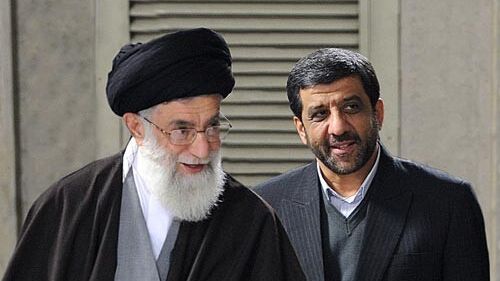
Iranian hardliners in control of parliament and government mostly advocate a harsh response to protests but even among them there are some who call for dialogue.
On the same day when 227 members of Iran’s parliament (Majles) called for death sentence for those arrested during recent protests, Iran's Minister of Tourism and Cultural Heritage, Ezzatollah Zarghami, advocated dialogue between the government and the protesters, highlighting some chaos and indecision in the ruling circles.
Speaking in a meeting with Sharif University students Sunday, Zarghami, a former Revolutionary Guard (IRGC) officer who was once Iran's culture minister and the head of the country's state television, admitted that "Some of the approaches of Iranian officials are wrong but they fear the regime will face a serious danger if they put a step back from their position.”
Referring to the news of young Iranian knocking Shiite clerics' turbans off their heads, Zarghami said these are low-income clerics who are paying for the luxurious lifestyle of rich mullahs.
He insisted that Iran needs reforms and many members of the elite have warned the government about this. "Many others warned about the morality police and said what they were doing was wrong," he said.
Public statements by many officials, such as Zarghami, show they are still stuck in the perception that if hijab enforcement is relaxed, protests will end, but what protesters say in the streets is that they have passed that stage and want the regime to fall.
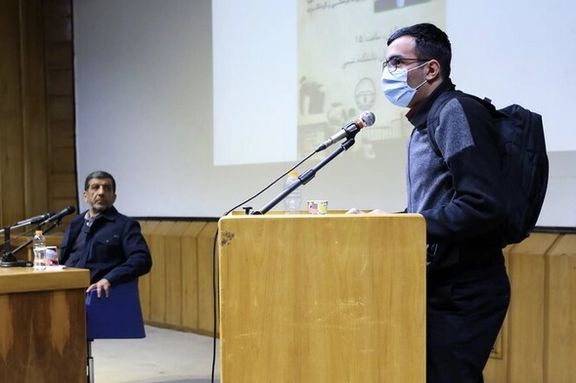
Zarghami who has been active on social media for years, acknowledged that Iranians no longer trust the official media, and journalist do not write some of what is going on in the society, fearing government reprisal. He admitted that "You cannot say anything [in Iran] if there is no social media."
He criticized officials, without naming anyone, for failing to understand the people and their anger, and said he himself was frustrated because of the way his candidacy in the 2021 presidential election was handled.
In one of the most controversial comments he made in the presence of the students, he said: "When you look at some financial corruption cases, you will see that individuals from all parts of the establishment are involved in it."
But why Zarghami can say these things and get away while other officials do not? Perhaps one of the reasons is that others have no ambition for the future and simply wish to protect what they have. But Zarghami, more likely, still wants to be Iran's next president and having smelled the need for change, he probably thinks the regime will have no choice other than surrendering to some of the protesters' demands. By trying to talk to Sharif University Students who have been in the forefront of the protests, he is touting himself as the man who can make peace with Iran's angry young men and women. But the question is to what extent hardliners in the core of the regime, and students in the forefront of protests, would listen to him.
Reformist cultural activist Hadi Khaniki has likened the need to hold dialogue with the youth to chemotherapy to cure a cancer patient. "It is painful and hard, but it might have some good effect," Khaniki told Etemad Online website. A cancer patient himself, Khaniki said: "The country has a cancer which has its roots among top-level officials and if no one pays any attention to that, the cancer will spread to the other parts of the system.
In another development, Hassan Khomeini, the ambitious grandson of Ayatollah Ruhollah Khmomeini, the fundamentalist founder of the Islamic Republic suggested in an interview Etemad Online that "The government had better begin to listen to the people." He said if the situation develops into a deadlock, our only way out would be to seek democratic solutions. He ignored the fact that he has got his position of wealth and power through non-democratic ways, in a hereditary system.
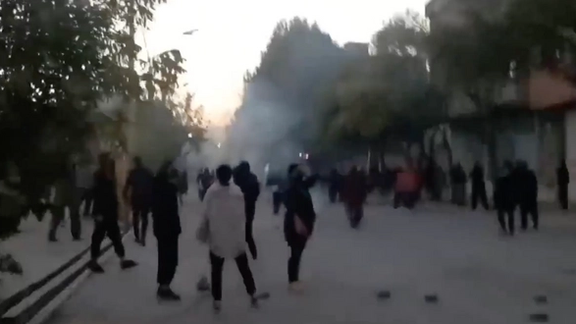
Monday was the 52nd day of the protests sparked by the death in custody of Mahsa Amini, with protests and strikes reported from her hometown as well as other Kurdish cities.
The Kurdish-majority city of Marivan was still the scene of sporadic clashes between people and security forces for the second day following the death of Nasrin Ghaderi -- a PhD candidate in philosophy who died on Saturday after being beaten by security forces with batons during protests in Tehran -- while residents in the provincial capital of Kordestan, Sanandaj, were also out on streets chanting antigovernment slogans.
The situation was also tense in the city of Siahkal, in the northern province of Gilan, where security forces used pellet guns and tear gas to prevent people from holding a gathering to mark the death of Erfan Zamani, a 23-year-old protester who was killed by security forces three days ago in another city of province. Despite heavy rain, a large number of people had gathered in the city for the mourning ceremony.
In large cities, such as the capital Tehran, pockets of protests were reported but most of the gatherings were focused on civil disobedience against the clerical regime.
Citizens of some of Tehran’s neighborhoods as well the nearby city of Karaj have kept the protests going with whatever they can, be it chanting slogans from their roofs and windows, long honks from their cars and even singing the songs that have been spreading on social media since the beginning of the protests.
In Tehran, protesters were also giving out candies to women who had unveiled in public along short notes that read "Thanks for making the city beautiful with your hair. Woman, Life, Freedom."
In Rasht, Qazvin and Tehran people expressed their support for the protests with writing slogans on the walls, hanging banners with supportive messages from overpasses or burning pictures and statues of Islamic Republic figures or symbols, such as Supreme Leader Ali Khamenei or IRGC commander Qasem Soleimani killed in a targeted US air strikes in Iraq in 2020.
On Monday night, the Islamic Republic's security forces also blocked the roads to Bushehr's international airport in southern Iran and used tear gas and pellet guns against people who sought to give a hero's welcome to members of Iran's beach soccer team after their moves in solidarity with protesters. Some players of the national squad hail from the city of Bushehr.
People in large cities have also started hanging puppets of mullahs from the pedestrian bridges as a symbolic threat against the clerics. A new trend that has been growing across the country is flipping the turbans of the clergy as they walk in streets.
Social media users also launched an online petition, calling on Twitter to ban Khamenei from the platform. For 43 years, the Islamic Regime in Iran, led by Khamenei, has overseen the brutal and systemic persecution of its own people, torturing, raping, and killing civilians who oppose the regime, read the petition.
Earlier in the day, the country’s hardliner chief Justice Gholam-Hossein Mohseni-Ejei vowed to intensify the punishment of those arrested during the protests following a call by the parliament members who have urged the judiciary to issue death sentences for the protesters.
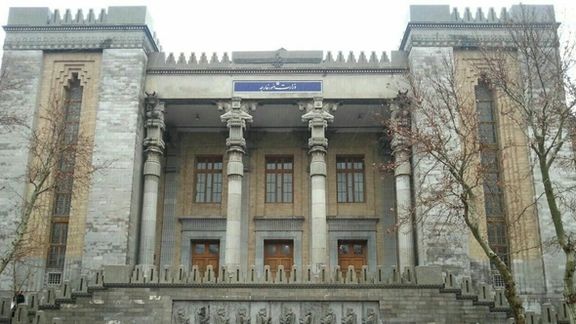
Iran’s Foreign Ministry has summoned the Norwegian ambassador over remarks made by the country’s parliament speaker criticizing the Islamic Republic over ongoing protests.
The Norwegian envoy to the Islamic Republic, Sigvald Tomin Hauge, was summoned by the ministry in protest to the “unacceptable statements” of the Speaker of the Parliament of this country against Iran.
Masud Gharahkhani, an Iranian-born lawmaker, and president of Norway’s parliament expressed solidarity with anti-government protests in Iran on Friday in an interview with Iran International.
“You’ve been in power for 44 years, enough is enough,” he addressed the Islamic Republic and its Supreme Leader Ali Khamenei in a message during his interview.
Iran called his remarks “interventionist” saying such statements are “unacceptable”.
This is the second time Iran summons Norway’s envoy over Gharahkhani’s remarks since September.
Meanwhile, an Iranian member of the Swedish parliament published a video on his Instagram page asking Iranian leaders Ali Khamenei, President Ebrahim Raisi and the IRGC commander Hossein Salami to pack their luggage and prepare to travel to the International Court of Justice in The Hague to be held accountable for their crimes.
Alireza Akhundi further called on the Iranian army to join the people and support the protesters.
According to the Norway-based Iran Human Rights Organization, at least 304 people have been killed during the recent protests that began across Iran after the killing of 22-year-old Mahsa Amini by police in custody.